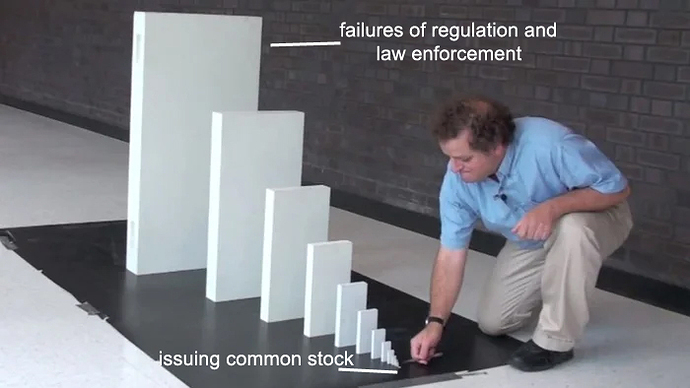Is a stock market crash disastrous, though? Genuine question. Like, it’s disastrous for the relatively few people with spare money to gamble on the market (if they stupidly wagered more than they could afford and if they were long instead of short), but what about for everyday people living paycheck to paycheck? In 2008, what would have happened to non-invested people if we allowed the criminal banks to fail? Right now, as an owner of zero shares in anything, why should I care if Tesla or the other S&P companies go bust? (And reasons like, “Because that would imply that a nuclear war is happening” don’t count.)
This is sort of what I’m thinking and brings in questions about regulatory capture and similar questions. I may not have adequately defined the ‘shock market’, it’s when questions like yours are answered by “That would be the worst thing ever” and “We should give them more money no matter what” etc.
If the feds/Fed hadn’t bailed out everyone the deflation would have probably been much worse and the economic damage would have been horrendous. They should have done what they did more or less and then put hundreds of bankers in prison, forced most of the companies they bailed out into bankruptcy, etc.
Does the fact that what you recommend isn’t what happened suggest anything to you?
Not about the financial instrument of publicly traded stock, no. What do you think it suggests?
What does it suggest things to you about?
You go first.
I think it suggests a capture of policy-making to a degree that would be called conquest if it had been achieved militarily. And I’m in the market for reasons to believe it’s not an inescapable result of the financial instrument of publicly traded stock.
If they were all giant privately held companies with the exact same political connections what would that have changed?
If only Goldman Sachs was owned by some sort of Koch brothers type holding company, that would solve everything.
I assume it would have changed the route by which they came to have acquired those political connections. And I suspect it would have resulted in far fewer people possessed of a firm belief that the highest possible good in any given economic crisis is to ensure that the owners of those companies never have a bad day. Large, privately held companies can be quite easily nationalised even if only temporarily, to ensure they continue to exist, for example.
The Koch brothers acquired political power the same way banks do. The owners give boatloads of money to politicians. Why would that change in the same political environment if the ownership is public or private?
I’m suggesting that the political environment is influenced by widespread publicly-traded ownership.
Why?
Because I think the economy behaves differently in one set of circumstances than in the other, that it’s more volatile with a Spock market, which leads to massive crashes, which creates the shock market, where people are so terrified of crashes that they’ll do anything to placate the market, even things that are objectively sub-optimal.
Kinda laid this all out in the OP if I’m honest.
None of that had anything to do with the financial crisis. The financial crisis was caused by a bunch of criminals who perpetrated a massive fraud on the people of the US, had it blow up the economy, and then used their political connections to save both their companies and themselves from going to prison. It was a failure of regulation and law enforcement. Blaming it on issuing common stock makes no sense at all.
In the 1930s there was a bunch of criminal bankers, we bailed out the banks and sent a bunch of them to jail. In the 1980s there was a bunch of criminal bankers in the s and l crisis and we bailed them out and sent a bunch of them to jail. In 2008 there were a bunch of criminal bankers and we bailed them all out and sent literally one guy to jail. The stock market is a thing in each time period. How did the market decide to jail a bunch of bankers in the 30s but none in 2008?
Describe the intermediate dominoes.
